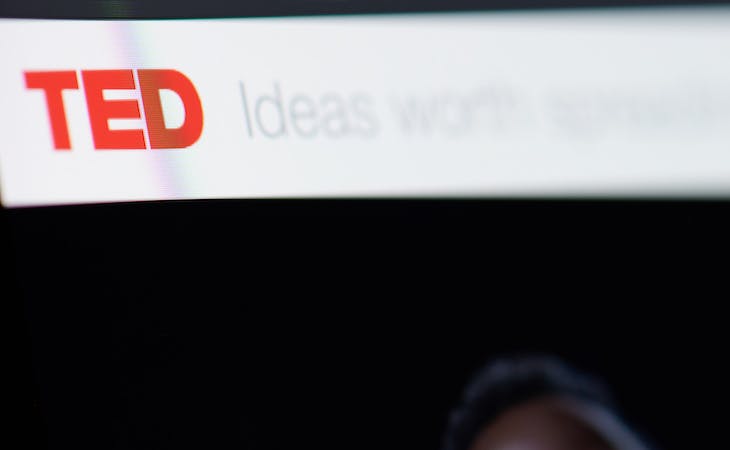If you’re looking for inspiration and research-backed life hacks straight from the greatest thinkers of our time, there’s a TED Talk for just about anything, including sleep.
There’s plenty to learn from sleep experts with decades of experience between them, including Daniel Gartenberg, PhD, CEO of SleepSpace (who you might remember served as a sleep coach to our content manager, Christina Heiser).
To expand your understanding of sleep and get some better Z’s, add these six TED Talks to your watchlist.
Daniel Gartenberg: “The brain benefits of deep sleep—and how to get more of it”
What it’s about: What’s the future of improving sleep efficiency look like? As Gartenberg explains, of all the stages of sleep, deep sleep is the most restorative stage thanks to long-burst brain waves known as delta waves.
He discovered that playing a gushing, static-like sound during deep sleep can promote the production of these waves, allowing you to get more out of a good night’s sleep. Someday, a personalized device could essentially play you the perfect sleep soundtrack—but it’s not available just yet.
The takeaway: “Our sleep isn’t as regenerative as it could be, but maybe one day soon, we could wear a small device and get more out of our sleep.”
Matt Walker: “Sleep is your superpower”
What it’s about: Matt Walker, PhD, founder and director of the Center for Human Sleep Science at the University of California, Berkeley, argues that it’s time to replace the mortally unwise advice of you can sleep when you’re dead with a new adage: The shorter your sleep, the shorter your life.
Walker provides a sweeping overview of the alarmingly bad things that can happen when you don’t get enough shut-eye, including a significant drop in your brain’s ability to learn, a greater risk of heart attacks and car crashes, zapped immunity, and an uptick in genetic activity linked to cancer, stress, and cardiovascular disease.
The fix for “one of the greatest public health challenges we face,” he says, is to “reclaim our right to a full night of sleep.” Stick with a regular sleep schedule—even over the weekends—and keep your sleep space cool for optimal Z’s, he suggests.
The takeaway: “Sleep is a non-negotiable biological necessity…There is simply no aspect of your wellness that can retreat at the sign of sleep deprivation and get away unscathed.”
Jessa Gamble: “Our natural sleep cycle is nothing like what we do now”
What it’s about: From horseshoe crabs to humans, the vast majority of living things evolved to have an internal body clock which is “the most underrated force on our behavior,” says science writer Jessa Gamble.
Gamble’s short talk centers on one wild research finding: “When people are living without any artificial light at all, they sleep twice every night,” with a window of “meditative quiet” in between. Amazingly, people who were allowed to live according to their natural sleep cycle in underground bunkers “report being so awake during the daytime they’re experiencing true wakefulness for the first time in their lives,” she says.
The takeaway: “We’re living in a culture of jet lag, global travel, 24-hour businesses, and shift work, and our modern ways of doing things have their advantages, but I believe we should understand the costs.”
Ariana Huffington: “How to succeed? Get more sleep.”
What it’s about: Ariana Huffington, founder of the Huffington Post and Thrive Global, experienced a terrifying wake-up call after she fainted from exhaustion at her desk and broke her cheekbone. What followed was a “journey of rediscovering the value of sleep” which culminated in her book, The Sleep Revolution.
In this call to action, Huffington explains that men tend to treat sleep deprivation as a virility symbol with fewer hours of sleep as a backward form of one-upmanship. The reality? Getting enough sleep makes for more interesting conversations, greater productivity, and a more fulfilling life. Changing our culture to prioritize sleep is the new feminist issue”-and women are going to literally sleep our way to the top,” she jokes.
The takeaway: “What is good for us on a personal level, what’s going to bring more joy, gratitude, effectiveness in our lives and be the best for our own careers, is also what is best for the world. So, I urge you to shut your eyes and discover the great ideas that lie inside us—to shut your engines and discover the power of sleep.”
Jeff Iliff: “One more reason to get a good night’s sleep”
What it’s about: If you’ve looked into sleep and Alzheimer’s disease, you’ve probably heard of amyloid-beta, sticky waste products that seem to contribute to the development of these conditions when they’re not effectively flushed out of our brains.
In this TED talk, neuroscientist Jeff Iliff, PhD, breaks down the “specialized network of plumbing” the brain uses to address “the problem of waste clearance,” but only when you’re sleeping.
The takeaway: “While our body is still and our mind is off walking in dreams somewhere, the elegant machinery of the brain is quietly hard at work cleaning and maintaining this unimaginably complex machine. Like our housework, it’s a dirty and thankless job, but it’s important.”
Russell Foster: “Why do we sleep?”
What it’s about: In this expansive, 20-minute talk, Russell Foster, PhD, head of the Sleep and Circadian Neuroscience Institute at the University of Oxford, explains what happens in our brains when we go to sleep, why getting enough sleep is so important for our physical and mental health, and how the link between disrupted sleep and mental illness could provide us with new ways to identify and treat depression, bipolar disorder, and schizophrenia.
He also debunks some of the most persistent sleep myths and shares a handful of helpful “sleep for dummies” tips.
The takeaway: “Our ability to come up with novel solutions to complex problems is hugely enhanced by a night of sleep.”
Listening to the right kind of podcast before bed can help you snooze. These are the best podcasts for sleep.




